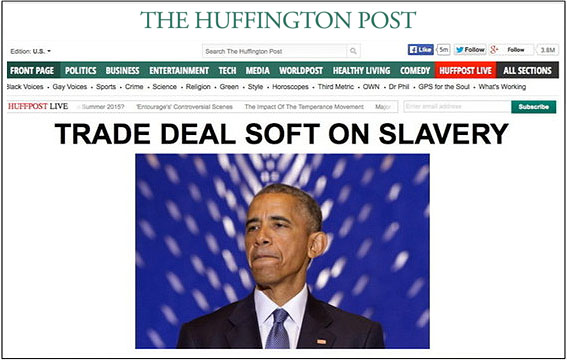OPINION
Fast Track: Will Obama, House decide to go soft on slavery?
By STAN SORSCHER
(June 5, 2015) — Trade deals write the rules for globalization. That is, they determine who will be winners, and who won’t.
Under NAFTA-style trade deals, the winners have been pharmaceutical companies, big polluters, banks, and companies like Nike who scour the earth for the lowest wages, and weakest regulations.
One ray of redemption, is the promise of high-standard 21st Century labor and environmental provisions. With good international standards, civil society can balance the power of global corporations and share gains.
Stop laughing. We need to get this piece right.
Bill Clinton promised us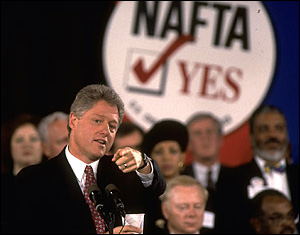 enforceable labor and environmental standards in NAFTA. He never enforced those standards. George Bush promised us enforceable standards in the “May 10th Agreements” which would fix NAFTA. He never enforced them.
enforceable labor and environmental standards in NAFTA. He never enforced those standards. George Bush promised us enforceable standards in the “May 10th Agreements” which would fix NAFTA. He never enforced them.
Now, President Obama promises us high-standards labor and environmental protections with meaningful enforcement in his Trans-Pacific Partnership (TPP).
Our lived experience is decades of failure to enforce labor standards.
President Obama’s promise is eloquent and inspiring. It would be more convincing if he had pursued even a single meaningful enforcement action after hundreds of murdered labor activists in Guatemala, Colombia and Honduras, and over 1,300 reported death threats.
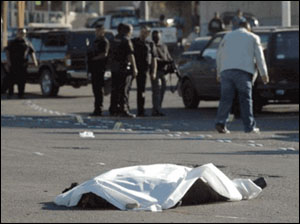 Our inaction has been a bitter disappointment to workers in Central America, Mexico, and the U.S. We have never applied our leverage by suspending trade preferences in a trade agreement.
Our inaction has been a bitter disappointment to workers in Central America, Mexico, and the U.S. We have never applied our leverage by suspending trade preferences in a trade agreement.
By chance, TPP has given us a clear opportunity to demonstrate commitment to high-standard labor protections.
The Senate recently approved Fast Track — procedural legislation that Congress will use for TPP. The Senate version of Fast Track appropriately excludes countries with the worst records for human trafficking, forced labor, and child labor. The U.S. State Department ranks countries each year, and Malaysia, one of the 12 TPP countries, falls into that worst category, called “Tier 3.”
The Malaysian electronics industry uses forced labor for 28% of its workforce to make products for well-known US companies. Forced labor and child labor drive its garment and palm oil industries.
Malaysia relies on its very weak human trafficking practices to give it a competitive advantage in global markets.
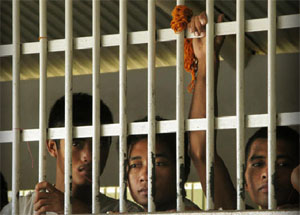 Recent press reports from Malaysia document unimaginably poor conditions for refugees, who are held for ransom, traded from one kidnapper to another, tortured and murdered. This is 21st Century slavery.
Recent press reports from Malaysia document unimaginably poor conditions for refugees, who are held for ransom, traded from one kidnapper to another, tortured and murdered. This is 21st Century slavery.
The Senate version of Fast Track does exactly what President Obama promised — if you meet international standards, you can have favorable access to our markets. If you fail to meet those standards you lose favorable access. When you improve, you regain favorable access. The Senate’s version of Fast Track can improve the lives of thousands of workers in industries that anchor Malaysia’s economy.
Incomprehensibly, the Obama administration is asking House members to weaken the Senate’s language to let Malaysia into TPP without any actual improvement in workers’ conditions. It would let Malaysia maintain human trafficking exactly the way it is now.
Malaysia has successfully ignored the State Department’s engagement on human trafficking for at least a decade. The President engaged Malaysia in 2012 and 2013 with waivers, suspending a drop to Tier 3 status. Malaysia’s enforcement against human trafficking actually declined in 2014.
Malaysia knows exactly what risk it runs with the labor provisions in TPP, because they helped negotiate TPP’s labor chapter, with the help of US industry advisors. Malaysia can confidently ignore the labor standards in TPP, in light of our decades of ineffective enforcement in Honduras, Guatemala, and Colombia under previous trade deals.
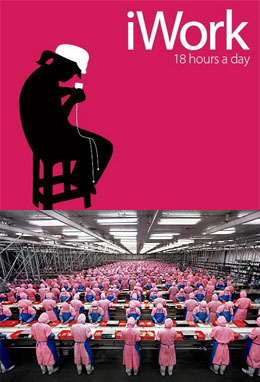 If the administration is able to weaken the Senate’s human rights language, we will be sending a message to the world that the President will sacrifice labor and environmental standards at the first opportunity. Once again, the interests of Intel, Apple, Hewlett-Packard, AMD, Texas Instruments and Dell would mean more to our trade negotiators than the suffering of refugees, exploitation of a quarter of the workers in the Malaysian electronics and garment industries and the children working in the palm oil industry. Corporate interests would mean more than the grief of families of men women and children showing signs of torture recently found in 139 graves.
If the administration is able to weaken the Senate’s human rights language, we will be sending a message to the world that the President will sacrifice labor and environmental standards at the first opportunity. Once again, the interests of Intel, Apple, Hewlett-Packard, AMD, Texas Instruments and Dell would mean more to our trade negotiators than the suffering of refugees, exploitation of a quarter of the workers in the Malaysian electronics and garment industries and the children working in the palm oil industry. Corporate interests would mean more than the grief of families of men women and children showing signs of torture recently found in 139 graves.
If the administration and House members shrug off Malaysia’s poor human rights record, they are sending a message to the rest of the Malaysian economy and any other country that competes against Malaysia in the global economy: the US will not enforce global rules on human trafficking.
It is worth noting that 5 other TPP countries — Peru, Singapore, Vietnam, Mexico, and Brunei — are on the Tier 2 list. Bad, but not the worst.
Over 150 House members signed a letter questioning Vietnam’s labor record and TPP. Over 100 House members also opposed trade concessions for Brunei, which criminalizes gay lifestyles under Sharia law. Mexico has successfully resisted improving its labor laws for the 20 years since NAFTA.
If Congress accepts the administration’s weaker condition, the message to Tier 2 countries is that exploiting workers carries no meaningful consequences. That message will certainly carry through into human trafficking in our own communities.
Our negotiators seem determined to win the race to the bottom.
On the other hand, if Congress excludes Malaysia from TPP, the five Tier 2 countries could take a lesson to improve. We will finally use the leverage we’ve always had to make other countries live up to written commitments.
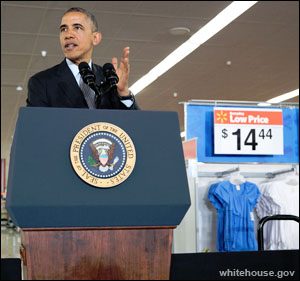 TPP proponents talk about “setting the rules” so that China won’t. Our engagement on human trafficking is a clear test of which rules we value, and the kind of leadership we will express through our trade policy.
TPP proponents talk about “setting the rules” so that China won’t. Our engagement on human trafficking is a clear test of which rules we value, and the kind of leadership we will express through our trade policy.
It’s clear that the Obama administration has had no interest in enforcing labor or environmental laws. Our negotiators have been criticized repeatedly for ignoring their labor advisory committee.
Fast Track gives Congress a fine opportunity to express our values as a country, and show that workers can be winners, even over objections from the Obama administration. The House should approve the Senate language and make Malaysia improve its human rights record.
 Stan Sorscher, a labor representative at the Society of Professional Engineering Employees in Aerospace (SPEEA), IFPTE 2001, is President of the Washington Fair Trade Coalition. This column originally appeared at Huffington Post and is reprinted here with the author’s permission.
Stan Sorscher, a labor representative at the Society of Professional Engineering Employees in Aerospace (SPEEA), IFPTE 2001, is President of the Washington Fair Trade Coalition. This column originally appeared at Huffington Post and is reprinted here with the author’s permission.

